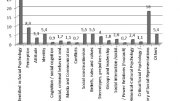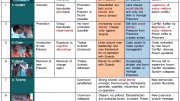 Biological psychologists are often employed in research settings.
Biological psychologists are often employed in research settings.
Ryan McVay/Photodisc/Getty Images
Biological psychology is a branch of psychology that studies the physiological causes of behavior. This field is sometimes referred to as behavioral neuroscience or biopsychology. Biological psychologists examine the relationship of the brain and nervous system with behavior, and related areas such as cognitive processes and emotions. To become a biological psychologist, you must complete specialized education and training in the field.
Education
Biological psychologists most often possess doctoral degrees in psychology, although some positions may accept candidates with a master's degree. The most frequently earned degree is the Ph.D, or doctor of philosophy, in biological psychology. Ph.D programs focus on research and require the completion of a dissertation. Students interested in pursuing advanced training in biological psychology may find universities that offer training programs or concentrations in biological psychology at the undergraduate level, though acceptance to these programs is extremely limited and competitive.
What They Do
Biological psychologists who have earned a doctorate are frequently employed as researchers. They conduct research on diverse topics such as the evolution of the brain, the interactions between different bodily systems and the brain, and the biological reasons behind motivation. They may also conduct animal studies to determine the effects of specific drugs or interventions on behavior. Biological psychologists at this level are also commonly employed as university professors, who teach psychology courses in addition to conducting research.
Biological psychologists who have only earned a master's degree may be able to obtain positions as research assistants. Some biological psychologists integrate the study of counseling psychology into their graduate programs, in which case they may work as clinical psychotherapists.
Related Reading: How to Become a Biological Engineer
Where They Work
Biological psychologists are usually employed in a research setting, such as a research institute, university, or laboratory run by a drug company or the federal government. They may occasionally find unique opportunities in other settings, such as aquariums, nature parks, and zoos. In the rare cases that biological psychologists opt for clinical work, they may be employed in settings like private practices, mental health clinics, or hospitals.
Source: work.chron.com
You might also like:

|
Mental Toughness: For Peak Performance, Leadership Development, and Success: How to Maximize Focus, Motivation, Confidence, Self-Discipline, Willpower, and Mind Power in Sports, Business, and Health eBooks (Personal Potential Books) |















Biological psychology, also known as behavioral neuroscience and psychobiology, is the study of physiological processes and how they affect human behavior. According to this concept, behavior is inextricably related to somatic or physiological experiences that are created by the brain's interpretation of sensory impingement. A biological psychologist studies these things.
Someone who studies brain structures and how they make people behave.
Famouns biological pyshologist include William James, and others such as :Claude Bernard, Charles Bell, and William Harvey.